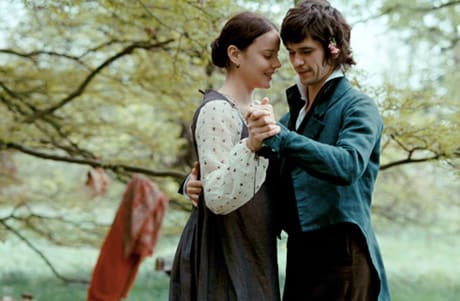My bias going into Jane Campion's Bright Star is that I don't get poetry. For years, I have patiently listened as people have explained to me the emotions that a carefully worded sonnet can evoke, sitting quite still as they proceed to grab a book and recite the complete works of William Butler Yeats. I appreciate the craft that goes into poetry but there is some invisible wall between me and poetry preventing any contact.
Imagine my surprise while watching Bright Star, then, when I started to detect a few cracks in that wall. The film chronicles the relationship between poet John Keats (Ben Whishaw) and Fanny Brawne (Abbie Cornish), but it's not so much a standard biography as a delicate, lyrical, romantic reverie. Most importantly, this is one of those rare films about an artist that actually vividly illustrates what made their art worthwhile.
Keats's poems are recited virtually wall-to-wall, and something about Campion's enthusiasm for the work comes across loud and clear. I can't quite explain how Campion pulled it off but the Keats poems in Bright Star are among the very few that have palpably moved me.
The film is chiefly a romance and like a lot of good romances it deals with star-crossed lovers — Fanny was of a respectable family, while Keats was, well, a poet. Campion is less interested in placing the romance within a mechanical plot than simply wallowing in its splendour.
Not a lot happens in Bright Star, per se, but Campion fills the film with lovely little incidental moments that add up to a sensual atmosphere: Cornish lying on her bed, her dress and the curtains blowing in the wind, for example, or Whishaw and Cornish just lounging around, pecking each other with little kisses.
Like the best poetry, Bright Star is simple, subtle and yet deeply, powerfully romantic.
(TVA)Imagine my surprise while watching Bright Star, then, when I started to detect a few cracks in that wall. The film chronicles the relationship between poet John Keats (Ben Whishaw) and Fanny Brawne (Abbie Cornish), but it's not so much a standard biography as a delicate, lyrical, romantic reverie. Most importantly, this is one of those rare films about an artist that actually vividly illustrates what made their art worthwhile.
Keats's poems are recited virtually wall-to-wall, and something about Campion's enthusiasm for the work comes across loud and clear. I can't quite explain how Campion pulled it off but the Keats poems in Bright Star are among the very few that have palpably moved me.
The film is chiefly a romance and like a lot of good romances it deals with star-crossed lovers — Fanny was of a respectable family, while Keats was, well, a poet. Campion is less interested in placing the romance within a mechanical plot than simply wallowing in its splendour.
Not a lot happens in Bright Star, per se, but Campion fills the film with lovely little incidental moments that add up to a sensual atmosphere: Cornish lying on her bed, her dress and the curtains blowing in the wind, for example, or Whishaw and Cornish just lounging around, pecking each other with little kisses.
Like the best poetry, Bright Star is simple, subtle and yet deeply, powerfully romantic.
